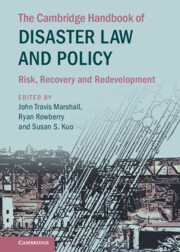Book contents
- The Cambridge Handbook of Disaster Law and Policy
- The Cambridge Handbook of Disaster Law and Policy
- Copyright page
- Dedication
- Contents
- Figures
- Maps
- Tables
- Contributors
- Foreword: Current Trends in Disaster Law and Policy
- Acknowledgments
- Introduction
- Part I Critical Perspectives on the Evolution of Disaster Law and Policy
- Part II Effective Governance as an Imperative for Responsive Disaster Law and Policy
- Part III Law’s Role in Promoting Hazard Mitigation: Intergovernmental, International, National, and Local Approaches
- Part IV Private Sector Initiatives to Promote Disaster Resilience and Recovery
- 21 Averting Disasters through Watershed Policy Advocacy: The Case of the Philippines’ Largest Highly Urbanized City
- 22 Insuring Natural Catastrophes in America
- 23 Corporate Compliance and Climate Change
- Part V Lawyers As Disaster Law and Policy Leaders: Training for Students and Guidance for Practitioners
- Part VI Cultural Heritage Protection and Cross-Disciplinary Opportunities for Advancing Disaster Law and Policy
- Part VII Disasters and Vulnerable Communities
23 - Corporate Compliance and Climate Change
from Part IV - Private Sector Initiatives to Promote Disaster Resilience and Recovery
Published online by Cambridge University Press: 27 October 2022
- The Cambridge Handbook of Disaster Law and Policy
- The Cambridge Handbook of Disaster Law and Policy
- Copyright page
- Dedication
- Contents
- Figures
- Maps
- Tables
- Contributors
- Foreword: Current Trends in Disaster Law and Policy
- Acknowledgments
- Introduction
- Part I Critical Perspectives on the Evolution of Disaster Law and Policy
- Part II Effective Governance as an Imperative for Responsive Disaster Law and Policy
- Part III Law’s Role in Promoting Hazard Mitigation: Intergovernmental, International, National, and Local Approaches
- Part IV Private Sector Initiatives to Promote Disaster Resilience and Recovery
- 21 Averting Disasters through Watershed Policy Advocacy: The Case of the Philippines’ Largest Highly Urbanized City
- 22 Insuring Natural Catastrophes in America
- 23 Corporate Compliance and Climate Change
- Part V Lawyers As Disaster Law and Policy Leaders: Training for Students and Guidance for Practitioners
- Part VI Cultural Heritage Protection and Cross-Disciplinary Opportunities for Advancing Disaster Law and Policy
- Part VII Disasters and Vulnerable Communities
Summary
Climate change has dramatically increased the frequency and severity of disasters including hurricanes, floods, wildfires, droughts, and pandemics. In a globally connected economy, climate-change fueled disasters disrupt supply chains and upend markets, affecting corporations no matter where they are located. From a risk-management perspective, however, climate change is just another external threat to hedge against, no different in principle than the risk that interest rates might rise or that an economic downturn could reduce the demand for a corporation’s products or services. Thus, corporations have reason to address the problem of climate change, but only to the extent that corporations can thereby produce value for their shareholders. This chapter argues, to the contrary, that climate change should trigger a compliance response. Unlike risk management, a compliance-based approach would require corporations to internalize the problem of climate change and to give it priority over competing considerations.
Keywords
- Type
- Chapter
- Information
- The Cambridge Handbook of Disaster Law and PolicyRisk, Recovery, and Redevelopment, pp. 378 - 386Publisher: Cambridge University PressPrint publication year: 2022



